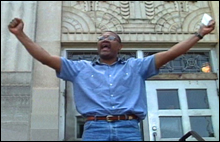 Hollywood studios looking for movie ideas should check out Jessica Sanders’s After Innocence. One after another, innocent people relate how they were convicted and then served years in prison and even on death row until exonerated by DNA or other evidence. Their stories of injustice, agony, and perseverance surpass any scriptwriter’s invention. Perhaps some feature filmmaker could render these tales with the poignancy, irony, and depth that Walter’s well-intended but superficial account lacks.
Hollywood studios looking for movie ideas should check out Jessica Sanders’s After Innocence. One after another, innocent people relate how they were convicted and then served years in prison and even on death row until exonerated by DNA or other evidence. Their stories of injustice, agony, and perseverance surpass any scriptwriter’s invention. Perhaps some feature filmmaker could render these tales with the poignancy, irony, and depth that Walter’s well-intended but superficial account lacks.
Sanders has none of the cinematic ambitions of an Errol Morris, whose The Thin Blue Line (1988) addressed a similar topic and sprang Randall Adams from death row in Texas. That’s not necessarily a bad thing — her goal is not to dramatize a single case but to explore an entire issue. Her style of choice, though, is the infomercial. She translates each of her portraits into a sound bite pushing an agenda with feel-good manipulativeness. And the treacly piano soundtrack! It puts the Hallmark touch on every talking point; Philip Glass it’s not.

But the cause, the stories, and especially the characters transcend Sanders’s fumbling efforts. I’d point an interested studio in the direction of Wilton Dedge, who was convicted of sexual battery in Florida and served 22 years of a life sentence. His persistence and that of Barry Scheck’s Innocence Project resulted in DNA tests that proved that he wasn’t the culprit. Three years after his innocence had been established, the intransigent Florida justice system still refused to overturn the conviction; it was more interested in escaping blame than in releasing an innocent man. Sanders uses Dedge’s ongoing story as a recurring narrative to add suspense and coherence to her film. But his diabolical, Kafka-esque fate fits uneasily into the filmmaker’s generally sunny, progressive message. Maybe Hollywood could do it justice; I’d suggest Arliss Howard as the dignified, haunted, almost æthereal Dedge.
The interweaving narratives include that of Lowell resident Dennis Maher, who was identified by a rape victim as her assailant and spent 19 years at Walpole before DNA evidence cleared him. How did he avoid turning that false accusation and those lost years and into bitterness and rage against the system and against women? “Therapy.” Sanders misses an opportunity to delve deeper into her subject’s suffering and resilience.
The Maher blunder aside, Massachusetts is one of the few states that has attempted restitution. The attorney who prosecuted the case apologized, and the state has since passed legislation providing wrongful-conviction compensation. Few other states do so, most taking Florida’s heel-dragging route. Meanwhile, Scheck estimates that thousands of innocent prisoners still languish behind bars and on death row. Such revelations are especially troubling at a time when the administration is seeking to curtail further the rights of the innocent. Despite Sanders’s limitations, her film is essential viewing.